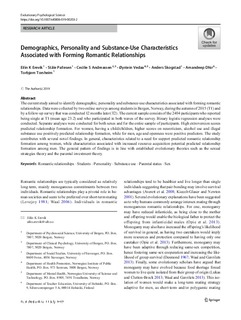| dc.contributor.author | Erevik, Eilin K. | |
| dc.contributor.author | Pallesen, Ståle | |
| dc.contributor.author | Andreassen, Cecilie Schou | |
| dc.contributor.author | Vedaa, Øystein | |
| dc.contributor.author | Skogstad, Anders | |
| dc.contributor.author | Dhir, Amandeep | |
| dc.contributor.author | Torsheim, Torbjørn | |
| dc.date.accessioned | 2019-11-29T14:35:52Z | |
| dc.date.available | 2019-11-29T14:35:52Z | |
| dc.date.created | 2019-07-13T13:41:17Z | |
| dc.date.issued | 2019-07 | |
| dc.identifier.citation | Erevik, E.K., Pallesen, S., Andreassen, C.S. et al. (2019) Demographics, personality and substance-use characteristics associated with forming romantic relationships. Evolutionary Psychological Science. | nb_NO |
| dc.identifier.issn | 2198-9885 | |
| dc.identifier.uri | http://hdl.handle.net/11250/2631138 | |
| dc.description.abstract | The current study aimed to identify demographic, personality and substance-use characteristics associated with forming romantic relationships. Data were collected by two online surveys among students in Bergen, Norway, during the autumn of 2015 (T1) and by a follow-up survey that was conducted 12 months later (T2). The current sample consists of the 2404 participants who reported being single at T1 (mean age 23.2) and who participated in both waves of the survey. Binary logistic regression analyses were conducted. Separate analyses were conducted for both sexes and for the entire sample of participants. High extroversion scores predicted relationship formation. For women, having a child/children, higher scores on neuroticism, alcohol use and illegal substance use positively predicted relationship formation, while for men, age and openness were positive predictors. The study contributes with several novel findings. In general, characteristics related to a need for support predicted romantic relationship formation among women, while characteristics associated with increased resource acquisition potential predicted relationship formation among men. The general pattern of findings is in line with established evolutionary theories such as the sexual strategies theory and the parental investment theory. | nb_NO |
| dc.language.iso | eng | nb_NO |
| dc.publisher | Springer International Publishing | nb_NO |
| dc.rights | Navngivelse 4.0 Internasjonal | * |
| dc.rights.uri | http://creativecommons.org/licenses/by/4.0/deed.no | * |
| dc.subject | psykologi | nb_NO |
| dc.subject | personlighet | nb_NO |
| dc.subject | rusmisbruk | nb_NO |
| dc.subject | personlige forhold | nb_NO |
| dc.subject | romantiske forhold | nb_NO |
| dc.title | Demographics, personality and substance-use characteristics associated with forming romantic relationships | nb_NO |
| dc.type | Journal article | nb_NO |
| dc.type | Peer reviewed | nb_NO |
| dc.description.version | publishedVersion | nb_NO |
| dc.rights.holder | © The Author(s) 2019 | nb_NO |
| dc.subject.nsi | VDP::Social science: 200::Psychology: 260 | nb_NO |
| dc.source.pagenumber | 13 | nb_NO |
| dc.source.journal | Evolutionary Psychological Science | nb_NO |
| dc.identifier.doi | 10.1007/s40806-019-00203-2 | |
| dc.identifier.cristin | 1711394 | |
| cristin.unitcode | 217,7,3,0 | |
| cristin.unitname | Institutt for sosialfag | |
| cristin.ispublished | true | |
| cristin.fulltext | original | |
| cristin.qualitycode | 1 | |

